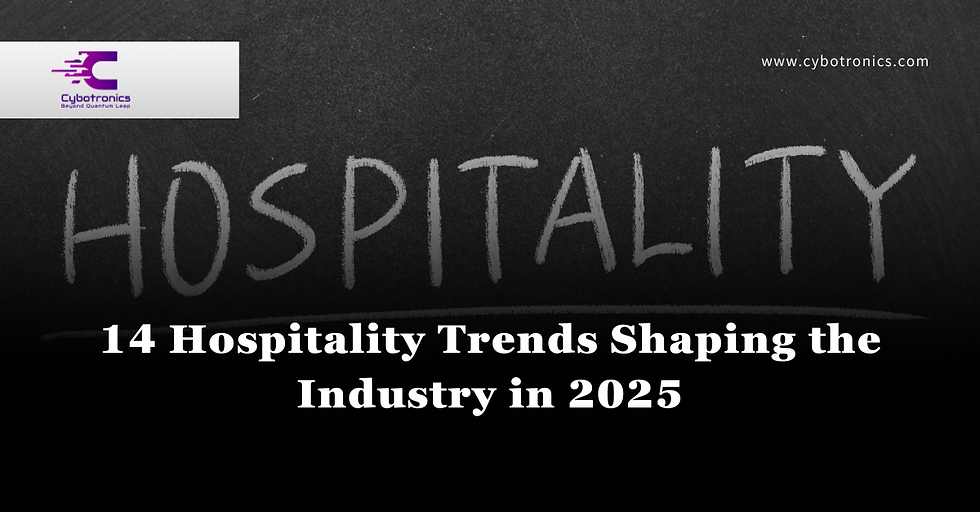14 Hospitality Trends Shaping the Industry in 2025
- Pranita Patil
- Jul 23, 2025
- 3 min read
Updated: Nov 5, 2025
What Leaders Must Know

In the post-pandemic world, the hospitality industry is evolving faster than ever. With rising customer expectations, rapid digital transformation, and renewed focus on wellness and safety, hoteliers and hospitality leaders must stay ahead of the curve or risk falling behind.
At Cybotronics, we work closely with hotels, resorts, and travel-tech companies to build AI-driven, scalable, and guest-centric digital experiences. Here’s a strategic look at the top hospitality industry trends for 2025 that every CEO and CTO should prioritize.
1. AI-Powered Chatbots and Customer Service
Chatbots are no longer a novelty. In 2025, AI-driven bots handle real-time booking queries, check-in instructions, feedback collection, and concierge services all while learning from interactions. This not only reduces human workload but ensures 24/7 responsiveness across platforms.
✅Leadership Insight: Integrate chatbots with CRM to capture behavioral data and personalize guest experiences.
2. Mobile Check-In and Contactless Interfaces
Guests now expect seamless entry and exit. With mobile check-in, QR room access, and digital room service menus, hotels can minimize friction while enhancing security and hygiene.
✅Cybotronics Tip: Combine contactless check-in with identity verification and real-time occupancy tracking using IoT.
3. Artificial Intelligence (AI) for Personalization
AI is enabling real-time room rate optimization, automated upselling, and hyper-personalized marketing. By analyzing guest preferences, AI helps hotels deliver tailor-made experiences from pillow types to curated dining suggestions.
✅For CTOs: Use ML models to segment customer journeys and create dynamic pricing engines.
4. Robotics in Housekeeping and F&B
From robotic vacuum cleaners in hotel rooms to robotic arms serving sushi, automation is reshaping operations. Robots handle repetitive tasks efficiently, freeing human staff for higher-value interactions.
✅Leadership ROI: Robots improve consistency, reduce labor dependency, and enhance novelty in guest service.
5. Online Travel Agents (OTAs) and Meta Platforms
While OTAs continue to dominate the booking landscape, savvy hoteliers are leveraging meta-search platforms and direct booking campaigns to reduce commission losses and own the guest relationship.
✅Strategic Tip: Invest in loyalty programs and retargeting tools to boost direct bookings and build brand trust.
6. Personalization at Scale
Today’s travelers demand relevance. From greeting repeat guests by name to recommending personalized wellness packages, personalization builds brand loyalty and lifetime value.
✅ Cybotronics Approach: Use behavior-based triggers across apps and CRM for automated, personalized offers.
7. Sustainable Hospitality Practices
Eco-conscious guests expect green policies. Energy-efficient buildings, water-saving fixtures, digital receipts, and zero-waste kitchens are becoming industry norms not marketing gimmicks.
✅Sustainability Strategy: Leverage data dashboards to measure energy/water usage per guest and set reduction targets.
8. Health and Wellness Offerings
Wellness has moved beyond gyms and spas. Hotels are offering detox menus, in-room fitness, mindfulness sessions, and sleep optimization programs as part of premium guest packages.
✅Brand Differentiator: Wellness is now a profit center, not just an amenity. Curate health-forward experiences for niche segments.
9. Remote Work & B leisure Facilities
With hybrid work trends, hotels are redesigning rooms into “work-friendly” suites with ergonomic setups, noise-canceling zones, and smart tech. Coworking spaces and day-pass packages are also popular.
✅Opportunity: Monetize underutilized space by converting it into branded remote work hubs.
10. Contactless Payments & Digital Wallets
From NFC-enabled credit cards to Apple Pay and QR code-based billing, guests expect fast and secure payment options at every touchpoint.
✅Technology Stack: Integrate POS, PMS, and payment gateways to create a seamless guest billing experience.
11. Culinary Experiences and Food Tourism
Food has become a centerpiece of hospitality branding. Hotels are showcasing local chefs, hosting pop-up events, and curating farm-to-table experiences.
✅Revenue Insight: Partner with local farms and artisans to create packages that celebrate authenticity.
12. Emphasis on Local and Immersive Experiences
Travelers crave real, cultural connections. Hotels are integrating local art, organizing community tours, and offering immersive cultural sessions.
✅CX Tip: Use digital concierge tools to guide guests to personalized local experiences.
13. Post-COVID Hygiene Protocols
Enhanced cleaning, air filtration, and visible sanitation efforts remain essential. Transparency in safety policies boosts guest trust.
✅Operational Tip: Digitally display cleaning schedules and offer optional “contactless housekeeping.”
14. Hybrid Events and Smart Venues
From virtual weddings to hybrid corporate retreats, hotels are now event-tech platforms. Video walls, streaming infrastructure, and modular spaces are essential.
✅Future-Proofing: Equip spaces with plug-and-play AV setups and support multiple conferencing platforms.
Final Thoughts for Industry Leaders
The hospitality industry is no longer about beds and breakfasts it’s about experience orchestration. CEOs must align with technology, and CTOs must understand guest psychology. The intersection of personalization, automation, and sustainability is where tomorrow’s hospitality brands will thrive.
At Cybotronics, we’re building the digital backbone for modern hospitality businesses AI-driven personalization engines, cloud-native systems, and guest-centric interfaces that help you scale without compromise.
Let’s talk if you're ready to build a tech-first, guest-focused hospitality brand.



Comments